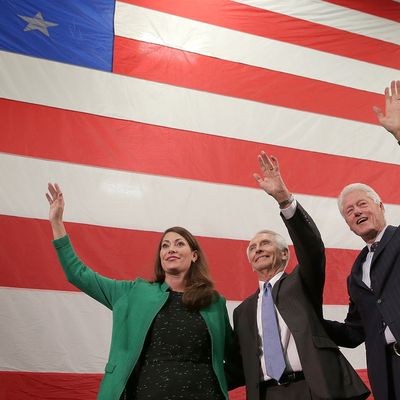
“At election time, sometimes people come get me. And I feel like an old racehorse in a stable — people just take me out, put me on the track, slap me on the rear, and see if I can run around one more time,” Bill Clinton told a group of rallygoers who turned out to see the former president in New Hampshire last week. He’s been using some version of that joke a lot in the final month of the campaign, and you can be sure he’s going to use it more: Across the country, worried Democrats are counting on the Clinton magic to save them from Election Day humiliation.
The Clintons are obliging. On Tuesday night, Bill campaigned with Alison Lundergan Grimes in Kentucky, after starting the week by campaigning for Mary Landrieu in Louisiana and Pat Quinn in Illinois. On Wednesday, he was in Flint, Michigan, and Long Island; today, he’s in Syracuse and Milwaukee. Hillary’s doing her part, too — she spent Tuesday in Colorado, trying to help Senator Mark Udall beat back Cory Gardner, and she’s also stumping in New England and North Carolina before week’s end. Perhaps more important (especially if she announces she’s running next year), the Clintons are raking in cash: Hillary alone raised something like $3.5 million in California. “Some people excel at raising money. Some people excel at turning out voters. The Clintons excel at both,” Steve Israel, the DCCC chairman, told the AP. “There is not one single competitive district in the country where both don’t do well.”
Because voters are so crazy for Bill Clinton, they don’t seem to mind the fact that his stump speeches are weirdly rambling and discursive. In 2012, I watched him give a 40-minute stump speech to a group of Penn kids that seemed designed (or maybe not designed) to shout out every single Democratic constituency — he touched on social security, defense budgets, Republican obstructionism, government spending for families of persons with disabilities — and the crowd, never mind that most were in diapers in 1992, went nuts for every single line. It was the frothiest I’ve ever seen a group of rallygoers anywhere, save for election night in Chicago. Here’s how Clinton followed up that line about being a racehorse in New Hampshire:
But look, this is serious, what we’re seeing everywhere is a battle to define the terms of our interdependence. We can’t escape each other anymore. Look at the social media, look what we know everywhere around the world instantaneously when it happens. Small business people in New Hampshire, if they’re properly connected, have good broadband download, can sell their products halfway around the world.
And, without stopping for air, he continued with what sounded a bit like Tom Friedman’s inner monologue sounds like when he’s brainstorming a column:
And there are a lot of good things about this interdependent world. But when borders are more porous and power is more diffuse, you have great non-governmental movements like the Gates Foundation or the Clinton Foundation or all the stuff that we do. It makes you happy and a lot of you have supported what I’ve tried to do. But it also makes more opportunities for ISIS which is more like a medieval raids that occurred all across the Asian Steppes into the Arabian Peninsula hundreds of years ago. And we’re fighting to define the terms of our interdependence.
When Clinton does get around to his point, it is usually to argue that voting for Republicans to protest the president is a lousy value proposition, because voters are stuck with President Obama for only two more years, but they’ll be stuck with the Senators they choose for six. That’s what he told voters in Arkansas last Friday — before treating them to a lengthy story involving a school superintendent south of Fayetteville whose brand-new home was struck by a tornado during his time as governor.
In Arkansas, the stem-winding interpersonal tales make a lot more sense. The Democratic side of the ballot this year looks like an invite list for one of the president’s card games: Mark Pryor, who goes back 40 years with the president to when his dad, David Pryor, was governor, is locked in a difficult race to keep his Senate seat; Mike Ross, the candidate for governor, got his start as Clinton’s driver in the 1980s; James Lee Witt, a Congressional candidate, is Clinton’s former FEMA director; Patrick Henry Hays, the mayor of North Little Rock and also a candidate for Congress this year, was one of a group of Arkansans who traveled to New Hampshire in 1992 on their own dime to drum up support for the then-long-shot presidential candidate.
If this year is a test for the strength of the Clinton brand among voters in the south, the signs right now don’t look very good. Pryor is trailing his Republican opponent in the polls by solid single-digit margins, as is Ross. The polling in House districts is spottier, but Witt is running uphill in the district that previously elected the very conservative Tom Cotton, the Republican now running against Pryor. Hays could be a bright spot, given that he’s running in the most liberal House district in the state — but merely being a Democrat in Arkansas this year is a handicap. Maybe the external factors are just too much this year for the Clinton brand to overcome. They’ll get a chance to prove they can still compete in the south soon enough.





























